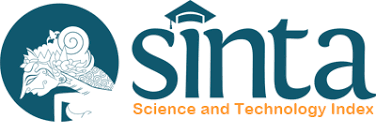The Influence Of Health Education On Increasing Self-Efficacy Of Post Partum Mothers At The UPT Ulaweng Public Health Center In 2023
Keywords:
Health Education, Post Partum Mother, Self-EfficacyAbstract
Health services for neonates (0-28 days) at least twice, once at the age of 0-7 days and one more time at the age of 8-28 days. The coverage of neonates visits in 2019 was 90.00%, decreasing in December 2020 by 85.00% (UPT Puskesmas Ulaweng). Providing Education Classes (KE) to Post Partum mothers using a module on the importance of breastfeeding for babies so that this can increase neonatal visits and the efficacy of mothers in breastfeeding their babies at the beginning of the postpartum period of 0-7 days through education . This study aims to determine the effectiveness of breastfeeding education class (KE) to increase the self-efficacy of post-partum mothers at the Ulaweng Public Health Center, Bone Regency in 2023. This type of research is a quasi-experimental design with a two group pretest-posttest design. The total sample size is 30 respondents (15 control group respondents who received a questionnaire without education class and 15 respondents in the intervention group who received education class and questionnaire). Samples were obtained using purposive sampling technique. Evaluation of maternal efficacy was carried out on the 7th day post partum both the control group and the intervention group.
References
R. C. M. Dodt, E. S. Joventino, P. S. Aquino, P. C. Almeida, and L. B. Ximenes, “An experimental study of an educational intervention to promote maternal self-efficacy in breastfeeding,” Rev. Latino-Am. Enfermagem, vol. 23, no. 4, pp. 725–732, Aug. 2015, doi: 10.1590/0104-1169.0295.2609.
Y. Mercan and K. Tari Selcuk, “Association between postpartum depression level, social support level and breastfeeding attitude and breastfeeding self-efficacy in early postpartum women,” PLoS ONE, vol. 16, no. 4, p. e0249538, Apr. 2021, doi: 10.1371/journal.pone.0249538.
E. D. S. Vieira, N. T. Caldeira, D. S. Eugênio, M. M. D. Lucca, and I. A. Silva, “Breastfeeding self-efficacy and postpartum depression: a cohort study,” Rev. Latino-Am. Enfermagem, vol. 26, no. 0, Sep. 2018, doi: 10.1590/1518-8345.2110.3035.
P. N. Fijriah and M. Fauziah, “Faktor Risiko yang Berhubungan dengan Kejadian Haemoragic Postpartum di Rumah Bersalin Wijaya Kusuma Tahun 2014,” vol. 10, no. 1, 1978.
A. Maleki, E. Faghihzadeh, and S. Youseflu, “The Effect of Educational Intervention on Improvement of Breastfeeding Self-Efficacy: A Systematic Review and Meta-Analysis,” Obstetrics and Gynecology International, vol. 2021, pp. 1–18, Aug. 2021, doi: 10.1155/2021/5522229.
M. Moshki, T. Baloochi Beydokhti, and K. Cheravi, “The effect of educational intervention on prevention of postpartum depression: an application of health locus of control,” Journal of Clinical Nursing, vol. 23, no. 15–16, pp. 2256–2263, Aug. 2014, doi: 10.1111/jocn.12505.
F. Evci̇Li̇ and D. Kaya, “The effect of postpartum afterpain on breastfeeding self-efficacy,” Cukurova Medical Journal, vol. 44, pp. 296–307, Dec. 2019, doi: 10.17826/cumj.559442.
D. S. Wu, J. Hu, T. P. McCoy, and J. T. Efird, “The effects of a breastfeeding self‐efficacy intervention on short‐term breastfeeding outcomes among primiparous mothers in Wuhan, China,” Journal of Advanced Nursing, vol. 70, no. 8, pp. 1867–1879, Aug. 2014, doi: 10.1111/jan.12349.
B. Mizrak, N. Ozerdogan, and E. Colak, “The Effect of Antenatal Education on Breastfeeding Self-Efficacy: Primiparous Women in Turkey”.
A. Wassef, Q. D. Nguyen, and M. St-André, “Anaemia and depletion of iron stores as risk factors for postpartum depression: a literature review,” Journal of Psychosomatic Obstetrics & Gynecology, vol. 40, no. 1, pp. 19–28, Jan. 2019, doi: 10.1080/0167482X.2018.1427725.
J. O. Fahey and E. Shenassa, “Understanding and Meeting the Needs of Women in the Postpartum Period: The Perinatal Maternal Health Promotion Model,” J Midwife Womens Health, vol. 58, no. 6, pp. 613–621, Nov. 2013, doi: 10.1111/jmwh.12139.
L. Li et al., “Determinants of breastfeeding self-efficacy among postpartum women in rural China: A cross-sectional study,” PLoS ONE, vol. 17, no. 4, p. e0266273, Apr. 2022, doi: 10.1371/journal.pone.0266273.
V. Davidavičienė, “Research Methodology: An Introduction,” in Modernizing the Academic Teaching and Research Environment, J. Marx Gómez and S. Mouselli, Eds., in Progress in IS. , Cham: Springer International Publishing, 2018, pp. 1–23. doi: 10.1007/978-3-319-74173-4_1.
S. Shorey, S. W.-C. Chan, Y. S. Chong, and H.-G. He, “Predictors of Maternal Parental Self-Efficacy Among Primiparas in the Early Postnatal Period,” West J Nurs Res, vol. 37, no. 12, pp. 1604–1622, Dec. 2015, doi: 10.1177/0193945914537724.
J. Byrne, Y. Hauck, C. Fisher, S. Bayes, and R. Schutze, “Effectiveness of a Mindfulness‐Based Childbirth Education Pilot Study on Maternal Self‐Efficacy and Fear of Childbirth,” J Midwife Womens Health, vol. 59, no. 2, pp. 192–197, Mar. 2014, doi: 10.1111/jmwh.12075.
R. R. Marzo, K. Z. Rou, O. Y. Yin, A. S. Gill, and A. Salam, “Knowledge, Attitude and Practice on Exclusive Breastfeeding among Mothers in Malaysia”.

















